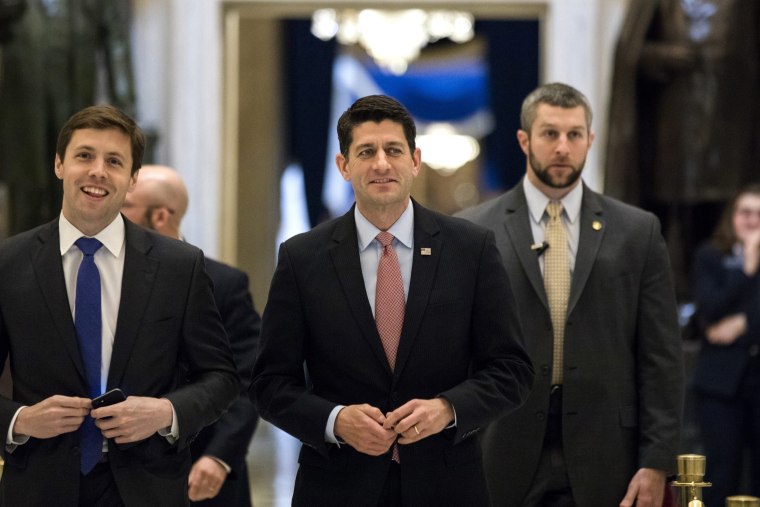The House passed a bill Friday that starts the repeal of the Affordable Care Act, officially completing the first step of the two-step process of repealing the health care legislation.
The measure passed 227 to 198 with no Democrats supporting it and nine GOP members voting against it. Leadership was able to gain the support of enough Republicans to pass the bill, despite concerns among members worried there was no plan to replace Barack Obama's signature healthcare law.
House Speaker Paul Ryan spoke on the floor before the vote, urging his colleagues to support the first stage of the repeal effort.
"By taking this first step toward repealing Obamacare, we are closer to giving Americans relief from the problems this law has caused," Ryan said in a statement after the vote. "This resolution gives us the tools we need for a step-by-step approach to fix these problems and put Americans back in control of their health care."
The Senate approved the bill during a marathon voting session early Thursday with only Republican support. Sen. Rand Paul, R-Kentucky, was the only Republican to vote against the Senate measure, in part, because the measure, which is a component of the budget, increases the federal deficit and also because of his concerns about the lack of a health care replacement plan.
Leadership's evolution on a timeline to repeal and replace Obamacare has given assurance to members who were nervous about repealing the health care law with no plan to replace it.
As recently as last week, Republican leadership said that it would take time — weeks or even months — to replace the massive health care law that currently gave coverage to an additional 20 million people and impacts one-sixth of the nation's economy.
But after hearing from rank-and-file Republicans across the conservative spectrum, and after President-elect Donald Trump publicly said - through tweets, an interview with the New York Times and in his press conference - that repeal and replace would happen "almost simultaneously," Republican leaders became more bullish about the timeline.
House Speaker Paul Ryan said on Tuesday, for the first time, that parts of the bill would be replaced "concurrently." And then on Thursday during a CNN town hall, Ryan said, "So, without getting into all of the legislative mumbo jumbo, we want to do this at the same time and in some cases in the same bill."
And a Republican aide said Ryan has personally committed to jittery Republicans that replace would happen quickly.
The change of tune helped members like Rep. Mark Meadows, R-N.C., the head of the conservative Freedom Caucus, to vote for the bill.
"While serious concerns remain, I have been please to hear the speaker commit to bringing up a healthcare replacement bill within days, now weeks, of a repeal measure," Meadows said in a statement.
But House Republicans saw nine defections from both the most conservative wings of the party, like Rep. Justin Amash, R-Mich., to the more moderate, like Rep. Charlie Dent, R-Penn.
Dent said that he's concerned that Republicans are rushing forward without having a "deliberate and thoughtful" replacement plan at the ready.
He said Republican leaders and the Trump administration needs to "fully develop and articulate a comprehensive and achievable replacement plan that meets the health needs of the people in our districts," Dent said in a phone interview.
The House's vote Friday completes the first step for repeal. The bill now directs four committees — two in the House and two in the Senate — to write the legislation to repeal the ACA. The self-imposed deadline is January 27 but leadership aides admit that is an unreasonable date and repeal legislation could take weeks.
While Ryan now insists that repeal and parts of replace will be done at the same time, the reality is complicated.
Because the Republicans are using a budget gimmick known as reconciliation, a process that enables legislation to pass the Senate by a simple majority, the only things that can be addressed in the legislation are tax and spend components.
Now that the timeline has sped up, Republicans are going to have to determine what can be repealed and what can be replaced under reconciliation's strict guidelines.
Everything else will likely need the support of 60 votes in the Senate.

